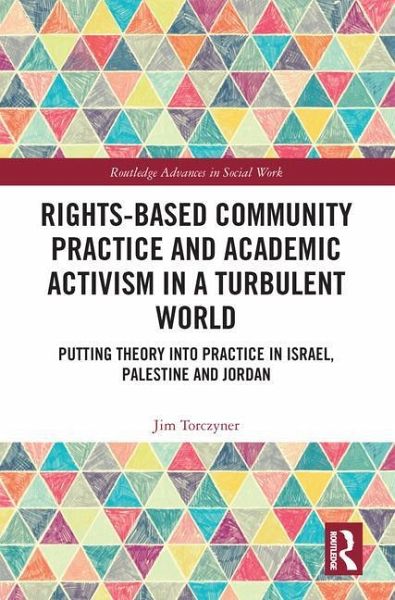
Rights-Based Community Practice and Academic Activism in a Turbulent World
Putting Theory into Practice in Israel, Palestine and Jordan
Versandkostenfrei!
Versandfertig in 6-10 Tagen
43,99 €
inkl. MwSt.
Weitere Ausgaben:

PAYBACK Punkte
22 °P sammeln!
Drawing on a theoretical model of coexistence premised on universality, reciprocity and inclusion, this book focusses on the development of academic social work programs and cross-border partnerships to promote social justice and peace in Israel, Palestine, and Jordan.Using the model of rights-based practice initiated by Professor Torczyner in Montreal and brought to the Middle East in the 1990s, it shows how the creation and brokering of cross-border partnerships added the concept of rights-based practice to the lexicon of these countries, established groundbreaking advocacy centers in the he...
Drawing on a theoretical model of coexistence premised on universality, reciprocity and inclusion, this book focusses on the development of academic social work programs and cross-border partnerships to promote social justice and peace in Israel, Palestine, and Jordan.
Using the model of rights-based practice initiated by Professor Torczyner in Montreal and brought to the Middle East in the 1990s, it shows how the creation and brokering of cross-border partnerships added the concept of rights-based practice to the lexicon of these countries, established groundbreaking advocacy centers in the hearts of disadvantaged communities, developed academic social work programs, and initiated important policy changes in each country to reduce inequality and promote social inclusion. Showing how this evolving method of rights-based practice rooted in theories of coexistence was uniquely adapted in different contexts and cultures while negotiating complex, volatile political environments, it illustrates how long-term peace can be advanced when like-minded people -irrespective of nationality or religion-find ways to promote common interest and a regional culture where all people share the same rights.
This book will be of interest to all social work students and practitioners interested in community organization and rights-based practice, as well as scholars, policy makers and practitioners of international development, political science, peace studies, Jewish studies, Middle Eastern studies, reconciliation, and conflict resolution.
Using the model of rights-based practice initiated by Professor Torczyner in Montreal and brought to the Middle East in the 1990s, it shows how the creation and brokering of cross-border partnerships added the concept of rights-based practice to the lexicon of these countries, established groundbreaking advocacy centers in the hearts of disadvantaged communities, developed academic social work programs, and initiated important policy changes in each country to reduce inequality and promote social inclusion. Showing how this evolving method of rights-based practice rooted in theories of coexistence was uniquely adapted in different contexts and cultures while negotiating complex, volatile political environments, it illustrates how long-term peace can be advanced when like-minded people -irrespective of nationality or religion-find ways to promote common interest and a regional culture where all people share the same rights.
This book will be of interest to all social work students and practitioners interested in community organization and rights-based practice, as well as scholars, policy makers and practitioners of international development, political science, peace studies, Jewish studies, Middle Eastern studies, reconciliation, and conflict resolution.














